13.频度副词和地点副词及副词(词组)作状语
外研版高一英语必修2_名师讲语法:M6_频度副词和地点副词
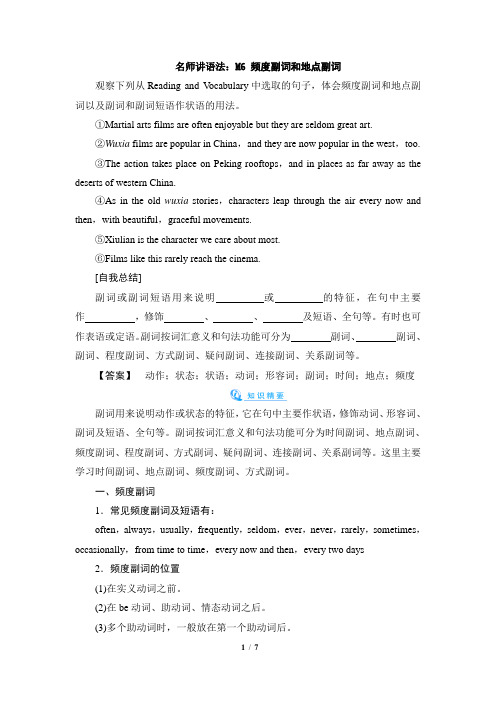
名师讲语法:M6 频度副词和地点副词观察下列从Reading and V ocabulary中选取的句子,体会频度副词和地点副词以及副词和副词短语作状语的用法。
①Martial arts films are often enjoyable but they are seldom great art.②Wuxia films are popular in China,and they are now popular in the west,too.③The action takes place on Peking rooftops,and in places as far away as the deserts of western China.④As in the old wuxia stories,characters leap through the air every now and then,with beautiful,graceful movements.⑤Xiulian is the character we care about most.⑥Films like this rarely reach the cinema.[自我总结]副词或副词短语用来说明或的特征,在句中主要作,修饰、、及短语、全句等。
有时也可作表语或定语。
副词按词汇意义和句法功能可分为副词、副词、副词、程度副词、方式副词、疑问副词、连接副词、关系副词等。
【答案】动作;状态;状语;动词;形容词;副词;时间;地点;频度副词用来说明动作或状态的特征,它在句中主要作状语,修饰动词、形容词、副词及短语、全句等。
副词按词汇意义和句法功能可分为时间副词、地点副词、频度副词、程度副词、方式副词、疑问副词、连接副词、关系副词等。
这里主要学习时间副词、地点副词、频度副词、方式副词。
一、频度副词1.常见频度副词及短语有:often,always,usually,frequently,seldom,ever,never,rarely,sometimes,occasionally,from time to time,every now and then,every two days 2.频度副词的位置(1)在实义动词之前。
副词的用法

副词的用法副词是指在句子中表示行为或状态特征的词,用以修饰动词、形容词、其他副词或全句,表示时间、地点、程度、方式等概念。
用法(1).作状语副词做状语常是评述性的,表示说话人的态度He works hard.(副词修饰动词)他努力工作。
You are quite right.(修饰形容词)你相当正确。
He parked the car very easily.(修饰副词)他很容易地把汽车停放好了。
Unfortunately he was out.(修饰整个句子)很不巧,他出去了。
(2).作定语少数地点副词和时间副词可以作定语,放在所修饰词的后边。
The boys there are talking about football.那边的男生正在讨论足球。
(3).作表语表示位置的副词作表语说明主语的状态或特征(above, across, inside, in, out,on,back, down,up,off,away,upstairs.)What's on at the theatre this evening?今晚剧院演什么节目?I must be off now. 我现在必须走了。
(4).作宾语补足语Let them in. 让他们进来。
We saw her off two days ago. 两天前我们为她送行。
位置(1).地点副词、时间副词和方式副词一般放在句末I'll wait for you here.(地点副词)我将在这儿等你。
I'll meet him at the station tomorrow.(时间副词)明天我将去车站接他。
Tomorrow I'll meet him at the station.有时为了强调时间,也可把时间副词放在句首。
The boy wrote the homework quickly. (方式副词)这个男孩子写作业很快。
18 19Module6SectionⅢGrammar频度副词和地点副词and副词短语作状语

Section 山Grammar ---------- 频度副词和地点副词&副词(短语)作状语[语境自主领悟][语法精要点拨]一、频度副词和地点副词i •频度副词频度副词表示动作发生的次数,频度副词通常位于实义动词之前、be动词/助动词/情态动词之后。
常见的频度副词(短语)有:often, always, usually, frequently, seldom, n ever, rarely, sometimes, occasi on ally, from time to time, every now and the n, every two days, once a weekI had n ever before bee n so un happy.我以前从来没有这么不高兴过。
The flower n eeds wateri ng every other day in summer.夏天花需要隔一天浇一次水。
[名师点津]含有否定意义的副词(seldom, never, rarely等)置于句首时,句子要部分倒装。
Never have I see n anything so won derful as that.以前我从未看见那样精彩的东西。
2 •地点副词表示地点的副词和表示位置关系的副词统称为地点副词。
地点副词通常置于句尾或句首。
(1) 表示地点的畐寸词:here, there, home, upstairs, dow nstairs, any where, everywhere, no where, somewhere, abroad, elsewhei等。
(2) 表示位置关系的副词:above, below, dow n, up, out, i n, across, back, along, over, round, around, away, n ear, off, on, in side, outsid等。
副词的用法
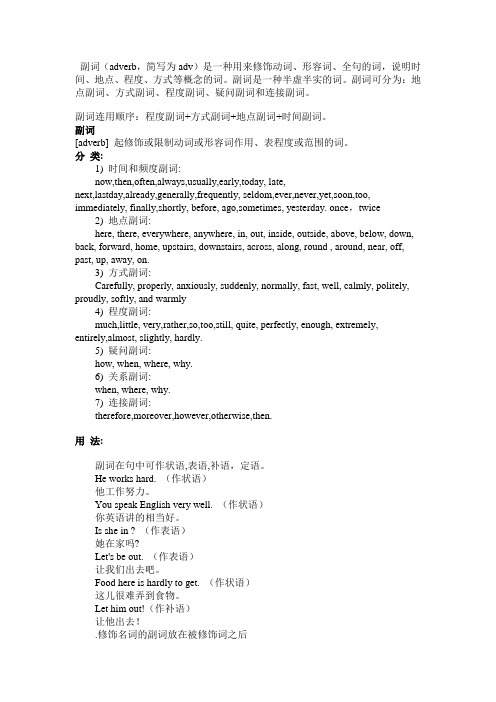
副词(adverb,简写为adv)是一种用来修饰动词、形容词、全句的词,说明时间、地点、程度、方式等概念的词。
副词是一种半虚半实的词。
副词可分为:地点副词、方式副词、程度副词、疑问副词和连接副词。
副词连用顺序:程度副词+方式副词+地点副词+时间副词。
副词[adverb] 起修饰或限制动词或形容词作用、表程度或范围的词。
分类:1) 时间和频度副词:now,then,often,always,usually,early,today, late,next,lastday,already,generally,frequently, seldom,ever,never,yet,soon,too, immediately, finally,shortly, before, ago,sometimes, yesterday. once,twice2) 地点副词:here, there, everywhere, anywhere, in, out, inside, outside, above, below, down, back, forward, home, upstairs, downstairs, across, along, round , around, near, off, past, up, away, on.3) 方式副词:Carefully, properly, anxiously, suddenly, normally, fast, well, calmly, politely, proudly, softly, and warmly4) 程度副词:much,little, very,rather,so,too,still, quite, perfectly, enough, extremely, entirely,almost, slightly, hardly.5) 疑问副词:how, when, where, why.6) 关系副词:when, where, why.7) 连接副词:therefore,moreover,however,otherwise,then.用法:副词在句中可作状语,表语,补语,定语。
副词详解

1. 副词的分类副词按词汇意义可分为:方式副词:well、fast、slowly、carefully、quickly、happily程度副词:very、much、enough、almost、rather、quite地点副词:here、there、out、somewhere、abroad、home时间副词:today、early、soon、now、then、recently频度副词:always,often,usually,sometimes,seldom,never否定副词:no,not,neither,nor疑问副词:where,how,why其他:also,too,only2.副词的基本用法:作状语:用来修饰动词、形容词、其他副词以及全句话,表示时间、地点、程度、方式等概念。
如:We should listen to our teachers carefully. (修饰动词)He is very happy today. (表时间)I asked, rather angrily. (修饰adv)In spring,I can see flowers everywhere. (表地点)Hopefully, we will meet again on Thursday.(修饰整个句子)作表语:主要指主语的方位,方向,动作情况。
常见副词有in, out, up, down, on, off, away, over... The fire is on.We’ll be home at ten tonight.作定语:主要为表示时间或地点的副词(here, there, in, out, up, down, below, above, upstairs, downstairs, indoors, outdoors, now, then)这些副词作定语时后置The air here is fresh.Write your name in the place below.The person downstairs is asking to see you.PS: a: 有些副词可以修饰名词,用以加强语气,常用这类副词有quite, rather, even等。
副词和副词性短语作状语在句中的位置
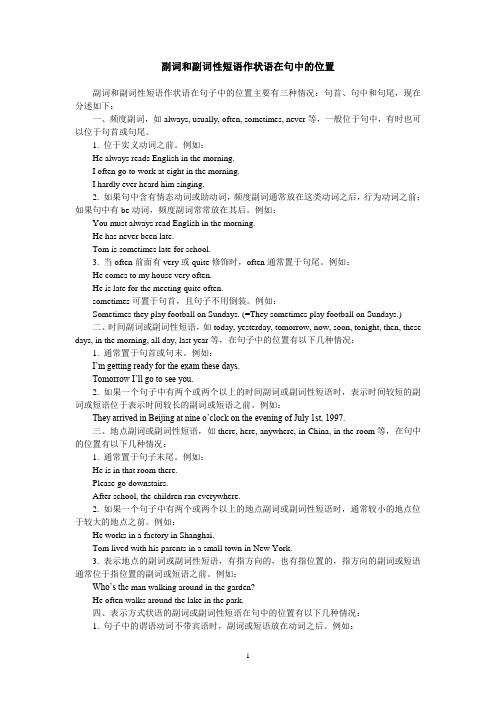
副词和副词性短语作状语在句中的位置副词和副词性短语作状语在句子中的位置主要有三种情况:句首、句中和句尾,现在分述如下:一、频度副词,如always, usually, often, sometimes, never等,一般位于句中,有时也可以位于句首或句尾。
1. 位于实义动词之前。
例如:He always reads English in the morning.I often go to work at eight in the morning.I hardly ever heard him singing.2. 如果句中含有情态动词或助动词,频度副词通常放在这类动词之后,行为动词之前;如果句中有be动词,频度副词常常放在其后。
例如:You must always read English in the morning.He has never been late.Tom is sometimes late for school.3. 当often前面有very或quite修饰时,often通常置于句尾。
例如:He comes to my house very often.He is late for the meeting quite often.sometimes可置于句首,且句子不用倒装。
例如:Sometimes they play football on Sundays. (=They sometimes play football on Sundays.)二、时间副词或副词性短语,如today, yesterday, tomorrow, now, soon, tonight, then, these days, in the morning, all day, last year等,在句子中的位置有以下几种情况:1. 通常置于句首或句末。
例如:I’m getting ready for the exam these days.Tomorrow I’ll go to see you.2. 如果一个句子中有两个或两个以上的时间副词或副词性短语时,表示时间较短的副词或短语位于表示时间较长的副词或短语之前。
中考英语,“形容词和副词”需要注意的两个重要考点
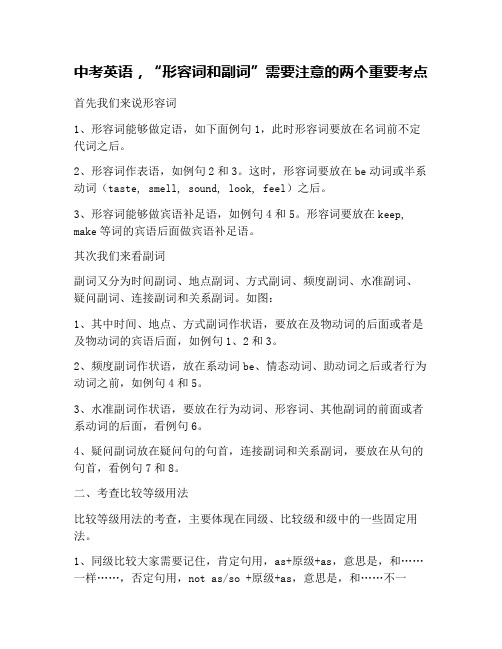
中考英语,“形容词和副词”需要注意的两个重要考点首先我们来说形容词1、形容词能够做定语,如下面例句1,此时形容词要放在名词前不定代词之后。
2、形容词作表语,如例句2和3。
这时,形容词要放在be动词或半系动词(taste, smell, sound, look, feel)之后。
3、形容词能够做宾语补足语,如例句4和5。
形容词要放在keep, make等词的宾语后面做宾语补足语。
其次我们来看副词副词又分为时间副词、地点副词、方式副词、频度副词、水准副词、疑问副词、连接副词和关系副词。
如图:1、其中时间、地点、方式副词作状语,要放在及物动词的后面或者是及物动词的宾语后面,如例句1、2和3。
2、频度副词作状语,放在系动词be、情态动词、助动词之后或者行为动词之前,如例句4和5。
3、水准副词作状语,要放在行为动词、形容词、其他副词的前面或者系动词的后面,看例句6。
4、疑问副词放在疑问句的句首,连接副词和关系副词,要放在从句的句首,看例句7和8。
二、考查比较等级用法比较等级用法的考查,主要体现在同级、比较级和级中的一些固定用法。
1、同级比较大家需要记住,肯定句用,as+原级+as,意思是,和……一样……,否定句用,not as/so +原级+as,意思是,和……不一样……,不如……。
还要知道表示倍数的用法,动词+倍数+ as+原级+as。
一起看下面的例句:2、两个事物之间的比较,考点比较多,有以下六种形式,大家需要用心体会。
1)最基础的比较级,A+动词+比较级+than B,意思是,A比B……。
2)much+比较级, 意思是,……得多。
3)The +比较级,the+比较急级,意思是,越……越……。
4)比较级+and+比较级,意思为,越来越……。
5)数词+名词+比较级+than。
6)比较级+than any (other)+ 名词单数,这个比较级的形式表示的是级的意思。
这么多背起来比较费劲,我们能够通过下面的例句来记住它,通过例句来记忆,一方面记住了考点,同时也学会了使用,会收到事半功倍的效果。
(完整版)初中英语语法归纳(副词)
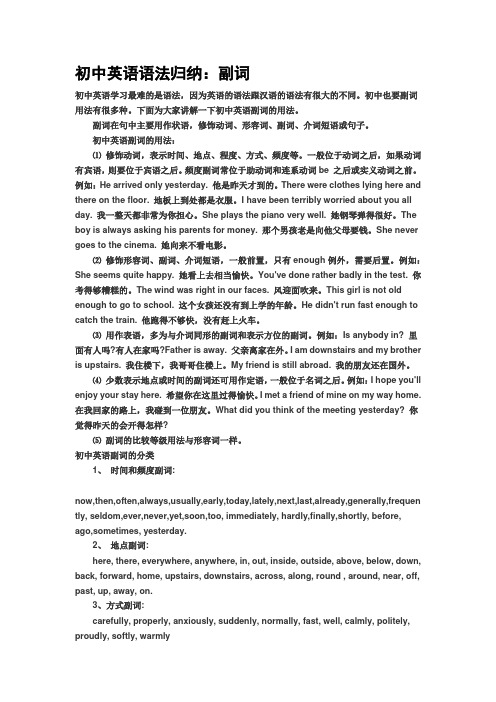
初中英语语法归纳:副词初中英语学习最难的是语法,因为英语的语法跟汉语的语法有很大的不同。
初中也要副词用法有很多种。
下面为大家讲解一下初中英语副词的用法。
副词在句中主要用作状语,修饰动词、形容词、副词、介词短语或句子。
初中英语副词的用法:⑴修饰动词,表示时间、地点、程度、方式、频度等。
一般位于动词之后,如果动词有宾语,则要位于宾语之后。
频度副词常位于助动词和连系动词be 之后或实义动词之前。
例如:He arrived only yesterday. 他是昨天才到的。
There were clothes lying here and there on the floor. 地板上到处都是衣服。
I have been terribly worried about you all day. 我一整天都非常为你担心。
She plays the piano very well. 她钢琴弹得很好。
The boy is always asking his parents for money. 那个男孩老是向他父母要钱。
She never goes to the cinema. 她向来不看电影。
⑵修饰形容词、副词、介词短语,一般前置,只有enough例外,需要后置。
例如:She seems quite happy. 她看上去相当愉快。
You've done rather badly in the test. 你考得够糟糕的。
The wind was right in our faces. 风迎面吹来。
This girl is not old enough to go to school. 这个女孩还没有到上学的年龄。
He didn't run fast enough to catch the train. 他跑得不够快,没有赶上火车。
⑶用作表语,多为与介词同形的副词和表示方位的副词。
例如:Is anybody in? 里面有人吗?有人在家吗?Father is away. 父亲离家在外。
- 1、下载文档前请自行甄别文档内容的完整性,平台不提供额外的编辑、内容补充、找答案等附加服务。
- 2、"仅部分预览"的文档,不可在线预览部分如存在完整性等问题,可反馈申请退款(可完整预览的文档不适用该条件!)。
- 3、如文档侵犯您的权益,请联系客服反馈,我们会尽快为您处理(人工客服工作时间:9:00-18:30)。
频度副词和地点副词及副词(词组)作状语一、频度副词和地点副词1.频度副词频度副词多置于实义动词之前,be动词、助动词、情态动词之后。
常见的频度副词(词组)有:often, always, usually, frequently, seldom, ever, never, rarely, sometimes, occasionally, from time to time, every now and then, every two days等。
图解“频度”副词They often volunteer to sweep the street.他们经常自愿清扫街道。
My parents have always encouraged me in my choice of career.在我选择职业时,父母总是鼓励我。
You must often keep this in mind.这一点你要牢记在心。
[点津]当表示否定的副词,如seldom, never, rarely置于句首时,句子要部分倒装。
Never in all my life have I heard such nonsense!我这辈子从没听过这种废话完成句子①He _______________ (经常迟到) for school.②She ________________ (通常出去) on Saturday nights.③My uncle _________________ (将永远不会忘记) what happened to him yesterday.(2)句型转换①I have never seen such a moving film.→Never _____________ such a moving film.②He seldom goes to see a film.→Seldom ___________ to see a film.2.地点副词地点副词通常放在句尾,也可放在句首、句中。
地点副词常分为两类:地点副词和方位副词。
常见的表示地点的副词有:here,there,home,upstairs,downstairs,anywhere,everywhere,nowhere,somewhere,abroad,elsewhere等;常见的表示方位的副词有:above,below,down,up,out,in,across,back,along,over,round,around,away,near,off,on,inside,outside,past等。
I remember having seen him somewhere.我记得在什么地方见过他。
There you can find the boy.在那儿你可以找到那个男孩儿。
I was astonished to hear a big noise above.我听到从上面传来一声巨响,非常吃惊。
[点津]表示地点、方位的副词置于句首,且主语是名词时,句子需全部倒装。
There goes the bell.Let's go into the lecture hall.铃响了。
我们进入演讲大厅吧。
The door opened and out came a policeman.门开了,走出来一名警察。
[即时跟踪2](1)用适当的地点副词填空①Although I looked _______________,I couldn't find it.②He waved us goodbye and then drove ______.③Class was over and ______ rushed the children.(2)句型转换①Her diary about her new school life is below.→Below _____________ about her new school life.②You can't find such a beautiful scene anywhere else.→Nowhere ____________ such a beautiful scene.③A bird is flying up in the sky.→Up in the sky ______________.二、副词和副词词组作状语1.以-ly结尾的副词作状语副词的主要作用就是作状语,特别是以-ly结尾的副词,它们可以修饰动词、形容词、副词等。
You should listen carefully to the teacher in class.在课堂上,你应该认真地听老师讲课。
Slowly he opened the door and left the house.他慢慢地打开门,离开了房间。
Perhaps you're partly right.或许你在某种程度上是对的。
[名师点津]某些以-ly结尾的副词可以充当连词引导状语从句,常见的有:immediately, directly, instantly等。
I gave him the money immediately I arrived home.我一到家就把钱给他了。
2.不以-ly结尾的副词作状语还有相当多副词不以ly结尾,它们可以修饰动词,也可以修饰形容词或副词。
She speaks French well.她法语讲得很好。
The bag isn't big enough.这袋子不够大。
3.修饰整个句子的副词作状语有一些副词可以修饰整个句子,表明说话人的态度,作句子的状语。
常见的这类副词有actually, briefly, certainly, clearly, fortunately, honestly, luckily, surprisingly,anyway等。
Honestly, I think you're very brave.说真的,我认为你很勇敢。
Fortunately, he caught the last bus at the last moment.幸运的是,他在最后一刻赶上了最后一班车。
4. 以-ly结尾的单词的不同词性有些副词有两种形式,一种与形容词同形,表示具体意义;一种以-ly结尾,表示抽象或引申含义。
close 接近地closely仔细地;密切地wide广阔地widely广泛地high高highly高度地;非常地deep深地deeply(抽象意义)深深地loud大声地loudly大声地(含“喧闹”之意)They live close to the church.他们住在教堂附近。
He is looking at the bill closely.他正仔细地看着账单。
[点津]friendly, lively, lovely, likely, orderly, sickly, motherly, fatherly等形式像副词,而实际上为形容词。
He is very friendly to us.他对我们很友好。
[即时跟踪3](1)用所给词的适当形式填空①Everyone thinks he is a ______ (high) skilled engineer.② ___________ (surprise), the baby survived the earthquake.③We decided not to climb the mountain because it was raining ________ (heavy).④The apples tastes ______ and sells ______.(good)⑤She looked ______at the news and looked _______ at the picture of her lostson.(sad)⑥I have heard ______ that the president was never ______ for work when he was alive.(late)(2)单句改错①His teacher spoke high of what he did.②I was deep moved by his words.③As long as you work hardly,you will be surely rewarded.④Our school is a big family, where we study together happy.⑤Would you like to go outing in order to get closely to nature?巩固训练:Ⅰ.单句语法填空1.A sudden stop can be a very frightening experience,_________ (especial) if you are travelling at high speed.2.The title will be _________ (official) given to me at a ceremony in London. 3.Recent studies show that we are far more productive at work if we take short breaks __________ (regular).4.Food in small pieces could be eaten easily with twigs which __________ (gradual) turned into chopsticks.5.They gave money to the old people's home either __________ (person) or through their companies.6.Abercrombie & Kent,a travel company in Hong Kong,says it _________ (regular) arranges quick getaways here for people living in Shanghai and Hong Kong.7.It's our hope that we will play a greater role in the market place and,__________,supply more jobs.8.Hardly had Sabrina finished her words when Albert said _________ (sharp),“Don't be so mean,” pointing a finger of warning at her.9.Everything seemed to be going ___________ (smooth) for the first two days after I moved to New York.10.If we leave right away,________ (hope) we'll arrive on time.Ⅱ.单句改错(每小题仅有1处错误)1.Instead, he hopes that his business will grow steady.2.At one time, I even felt my parents couldn't understand me so I hoped I could be freely from them.3.Lots of studies have shown that global warming has already become a very seriously problem.4.After looking at the toy for some time, he turned around and found where his parents were missing.5.Dad and I were terrible worried.6.As a result, the plants are growing somewhere.7.Nearly five years before,and with the help of our father,my sister and I planted some cherry tomatoes(圣女果) in our back garden.8.We are growing wonderfully tomatoes at no cost!。
